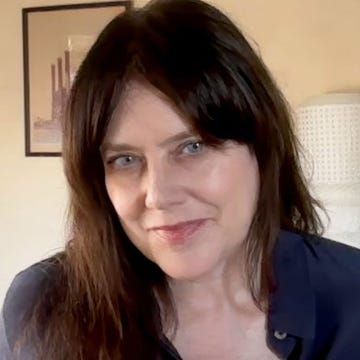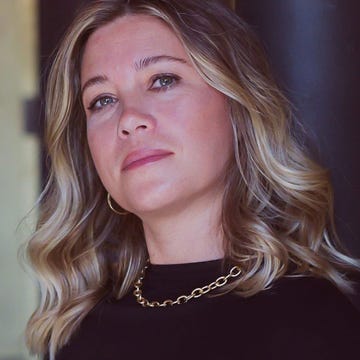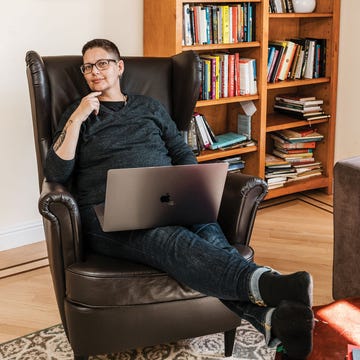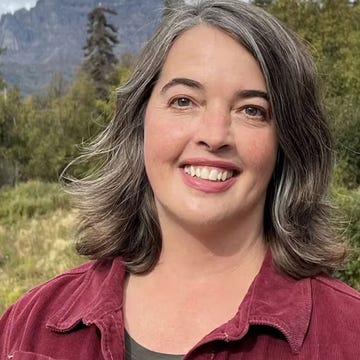When I talk to Lydia Kiesling over Zoom about her canny and perceptive political novel Mobility, now out in paperback, it seems fitting that she is working as a campaign manager on a ranked-choice city council race in Portland, Oregon. A text or two related to that public work comes in as she speaks to me from her dining room table. The protagonist of Mobility, Bunny Glenn, a diplomat’s daughter, shares certain autobiographical commonalities with Kiesling, but the two diverge in choices about what care we show people outside our immediate circles and how to participate in the public sphere.
The book opens in 1998 Baku, Azerbaijan, the petro-state that will host COP29, the United Nations climate change conference, later this month. Kiesling immerses readers in Bunny’s adolescence and intellectual formation there. Bunny observes the prep school boys, and the men around her opine on heavy matters, including the aftermath of the war between Armenia and Azerbaijan—“oil was the big thing about where they lived now, Bunny knew.” But she simultaneously experiences an ordinary, if privileged, American girl’s interest in daytime soap operas and shopping. Some of the novel’s keenest passages juxtapose Bunny’s insular teenage preoccupations with her unvarnished, skeptical observations about global issues, including those about which an older crush, who reappears later in her life, lectures her.
In subsequent chapters, we follow Bunny’s ambitious rise within male-dominated Big Oil. She’s driven by the girlboss feminism that became widely popular in the past quarter century. Her viewpoint makes for an interesting lens onto crucial matters not often grappled with in contemporary novels. As a temp, Bunny almost sleeps with a well-off finance guy and then takes stock of the boys and men she’s known, including her brother. “She considered the bros of her acquaintance at college, who had all participated in the same disappointing bacchanals as she and yet, to a man, seemed to have ended up in this kind of job. What was the class you took that qualified you to effortlessly earn money?” It’s partly this desire that eventually lands her in a job crafting narratives for a small oil company whose image she takes pains to refashion, emphasizing its work on renewables.
Kiesling began writing a first scene from Mobility during the first Trump presidency, a couple months before her debut novel, The Golden State, came out. Her friend, the author Manjula Martin (The Last Fire Season: A Personal and Pyronatural History), held a mini–writer’s retreat in Camp Meeker, California. While there, Kiesling wrote a new scene, which became part of Mobility. She wanted to write about the “peculiar” type of growing up in a foreign-service family who “travels with the bubble of empire wherever they grow.”
Her initial work on the novel was born out of disgust after years of unlearning many of the ideas with which she’d grown up. She says, “I grew up believing certain things about the role of the United States in the world as a force for kind of good—and progress, whatever that should mean.” The book, which has satiric aspects, allowed her to process that unlearning. Figuring out the authorial sensibility was difficult, she says, but over time, she wanted to go beyond “Look at all these terrible people” and acknowledge their humanity, too.
The younger years Kiesling describes reflect an unusual awareness of international issues and the imperial ideologies that she’d later come to resist. She was born in Israel, where her father was first posted, and then her family moved to Morocco; Greece; and Yerevan, Armenia, where she spent two summers but didn’t live full-time, and her family’s experiences are reflected in the novel’s pages. Despite springboarding from autobiographical material, Kiesling didn’t want to feel overly tied to what she’d seen as a child. She began reading books like Steve LeVine’s The Oil and the Glory: The Pursuit of Empire and Fortune on the Caspian Sea, which became influential to her work on the book.
In graduate school, while earning a master’s degree in Middle Eastern studies at the University of Chicago, Kiesling studied Turkic languages. Baku became a setting for Mobility, partly because, she says, “Turkish and Azerbaijani are mutually intelligible, more or less.” As she read about what was happening there in the ’90s, she contrasted it with her experience of Yerevan, which, she explains, “was so different because it’s not a petro-state. It did not have a resource that suddenly people from all over the world were trying to extract, as the Soviet Union came apart. Instead, there was tremendous, tremendous poverty, a lot of out-migration. And, of course, in Azerbaijan, there’s tremendous poverty and internal migration, but there was a stratum of extreme wealth that came in as a consequence of the oil and gas industry.”
In 2022, Kiesling traveled to Azerbaijan and recognized Baku to be a completely different city from the one it had been in 1998 because of “the huge building boom and effort to erase pieces of the city.” She paid a reader who grew up in Azerbaijan at the time Bunny would have been there as a teenager, as well an oil and gas scholar, to ensure that she wasn’t making blunders in drawing the places and times critical to the novel.
Kiesling says that she went back and forth on “how explicitly bad [Bunny] should seem.” She called on her own experience as a white woman of a certain class position to develop the character and elaborates that, in drawing Bunny, she considered that there are specific ways of being in community that allow you to perceive situations only as they relate to you and your immediate sphere, rather than address the interconnections among people or the obligations you have to those who are far away. The novel intimates other forces that motivate Bunny’s choices to assimilate to a male-dominated industry culture; as an adult, Bunny sees what happens to her mother, a divorcée later in life who gave up her career for the roving nature of her husband’s.
Yet there is an obligation to consider, Kiesling says, “how our systems conspire to create certain conditions,” and she notes that women like Bunny and herself are encouraged not to think about that. Bunny’s consumerism and ignoring of the problems she has a hand in creating are integral to the novel. “That part of Bunny I do feel some kind of affection and sympathy for because in a certain world, when you look at how women are expected to present themselves, that’s a lot of work,” Kiesling says. “Some of that upkeep is actually one of the reasons why it becomes easy not to pay attention to other things.”
She mentions another book she used for research, Gaslighted: How the Oil and Gas Industry Shortchanges Women, which features interviews with the extreme minority of women who worked in the industry. Kiesling remarks on the hypocrisy of oil companies for whom diversity means putting “a white woman on a company brochure” and continues, “But when there is a catastrophe like Deepwater Horizon, women and women of color are brought out to be like, Look, we’ve got this.... It’s very explicit and calculated.”
Mobility raises complex issues about neoliberal self-empowerment. Kiesling says that she supports workers organizing and empowering themselves, but she notes that the question arises, “Does that look like you thinking about the women in the frontline communities that are in what is now called the cancer belt, or are you thinking about how you are going to get more women into a C-suite position, where they will only reproduce the same sort of structure that they came up in?”
Inculcated with myths about the American empire and capitalist gumption that readers have watched her succumb to despite her doubts, Bunny seems unable to look at the broader costs and implications of the harmful industry in which she wants to succeed. She believes that it’s important to give women a seat at the table, but as Kiesling sharply frames it, “What she doesn’t ask is, What is the table?”•
Join us on November 21 at 5 p.m. Pacific time, when Gary Phillips will sit down with CBC host John Freeman and special guest Naomi Hirahara to discuss Violent Spring. Register for the Zoom conversation here.













